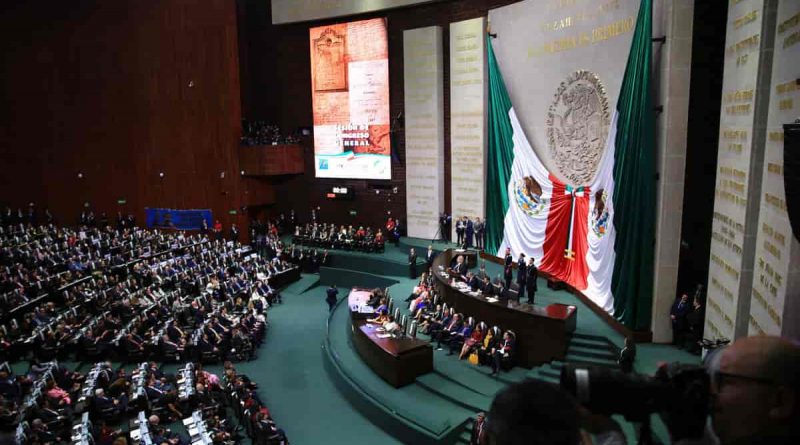Mexico Passes Controversial Electoral Reform Law
Austin DelSontro
Staff Writer
On February 26 an electoral reform law approved by the ruling party-controlled Congress of Mexico, which has been widely perceived as an attack on democracy, led to tens of thousands of Mexicans protesting against the government, France24 reports. Under the banner of #MiVotoNoSeToca (“Hands Off My Vote”), political and civic organizations joined together in the demonstration, gathering in the Mexico City square of Zócalo, as well as in other cities.
The Associated Press reports that the Zócalo Plaza, which is believed to have a capacity of almost 100,000 people, could not accommodate all the protesters who showed up, causing some to overflow onto nearby streets. Protesters, dressed in the white and pink colors of the National Electoral Institute (INE), denounced the actions of President Andrés Manuel López Obrador and his supporters who are seeking to reduce the independent body’s size and budget. The protest itself is similar to a slightly larger march last November.
The reforms, which passed the Senate 72-50 on February 22, are a controversial overhaul of the body overseeing the country’s elections, as Al Jazeera discloses. While opponents of the reforms argue that they will undermine democracy, President López claims it will save money and reduce political privileges. The changes, which include cutting the budget of the National Electoral Institute (INE), reducing staff, and closing offices, have sparked immediate opposition. Critics plan to challenge the reforms in the Supreme Court, while numerous protests have occurred. In December, the president proposed the legislative initiative, also known as “Plan B,” after failing to secure enough votes in Congress for a constitutional reform that included more extensive electoral changes. Despite concerns from opponents, the president has repeatedly dismissed claims that the reform package could threaten the integrity of elections, stating that the initiative aims to reduce the INE’s large budget and end its privileges.
As Reuters explores, President López believes that the reorganization will save $150 million annually and reduce the influence of economic interests in politics. However, opposition lawmakers and civil society groups have vowed to challenge the changes in the Supreme Court, arguing that they violate the constitution. Since Mexico shifted to a multi-party democracy after ending federal one-party rule in 2000, the INE has played a crucial role. Critics, however, critics are concerned about democratic backsliding and declining electoral confidence, a trend also observed in the United States and Brazil. López Obrador has repeatedly criticized the electoral agency, claiming that voter fraud robbed him of victory in the 2006 presidential election.
The Independent notes that President López has acknowledged that court challenges may arise against the bill, similar to previous ones that have been filed against his administration’s reforms. He views this as a normal occurrence in a democratic system and believes that the measure will withstand any constitutional challenges as none of it violates the law. Despite his current nonchalance about court challenges, he has previously criticized Mexico’s judiciary and accused judges of conspiring against his administration.
As CNN writes, the president, who assumed office in 2018, pledged to address inequality and poverty, disapproving of the supposed high salaries of top INE officials. He has also accused the institution of enabling electoral fraud in previous elections. It is also important to note the relatively high cost of elections in Mexico, as the government is required by law to provide almost all campaign financing. Furthermore, the electoral institute is tasked with issuing secure voter identification cards, which are widely accepted as a form of identification in Mexico, and managing voting in remote and potentially hazardous regions of the country.
Despite the massive protest, the second in over three months, Bloomberg reports President López remains widely popular. Citing a recent poll, 54 percent of Mexicans approve of the president while 45 percent disapprove of him. As for what happens next, the opposition has begun the process of seeking aid from the Supreme Court to nullify the legislation, citing the change as unconstitutional.
Image courtesy of Store Norske Lekison

